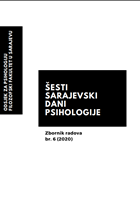Motivi za bavljenje psihoterapijom: iskustva psihoterapeuta
Motives for Doing Psychotherapy: Experiences of Psychotherapists
Author(s): Sabina Alispahić, Enedina Hasanbegović-AnićSubject(s): Higher Education , Neuropsychology, Clinical psychology, Behaviorism, Sociology of Education
Published by: Filozofski fakultet Univerziteta u Sarajevu
Keywords: psychotherapy; psychotherapists; motivation;
Summary/Abstract: People who want to complete education in a certain psychotherapeutic direction spend several years in education that involves a significant investment of energy, time and money. Yet very little attention is paid in researching their motives for such a life desicion. Empirical research on who actually becomes a psychotherapist and why is rare. Given the lack of research on this topic, especially in our context, in this research we wanted to explore the experiences of psychotherapists and their motivation to engage in psychotherapy. To better understand their experiences, we applied a qualitative methodology. Participants in the study were psychotherapists of different psychotherapeutic orientations: EMDR, systematic constellations, transactional analysis, cognitive-behavioral psychotherapy, reality psychotherapy, psychodrama and gestalt psychotherapy. Several psychotherapists have completed more than one psychotherapy education. A total of nine psychotherapists participated, five of whom were women and four men, with an average age of 31.4 years and an average of 4.8 years of experience working with clients. For the purposes of this research, we created an online questionnaire with 12 open-ended questions that related to several areas of our interest: the psychotherapeutic direction that participants deal with, their experience in psychotherapy, the type of clients they work with and their motives for psychotherapy. According to the participants’ responses, engaging in psychotherapy had a mostly positive effect on them, in the sense that they became more stable, developed better interpersonal relationships, assertiveness, and emotional intelligence. When it comes to the motives of the participants for psychotherapy, three topics stand out from their answers: the possibility of helping others, the possibility of continuous personal and professional development, and curiosity and interest in self-analysis and analysis of others. In this research, we also asked psychotherapists what makes them most happy or sad in working with clients. According to their answers, they are most happy when they see that the quality of life of the client has really improved, that they have made concrete changes and that they have become more authentic. On the other hand, it saddens them when they notice that clients do not have adequate resources and support from their environment, when they hear about their previous failures and difficult destinies. According to the results of this research, we can conclude that psychotherapists have various motives for engaging in psychotherapy, from altruistic to the desire for lifelong growth and development.
Journal: SARAJEVSKI DANI PSIHOLOGIJE: ZBORNIK RADOVA
- Issue Year: 6/2020
- Issue No: 6
- Page Range: 253-261
- Page Count: 9
- Language: Bosnian

